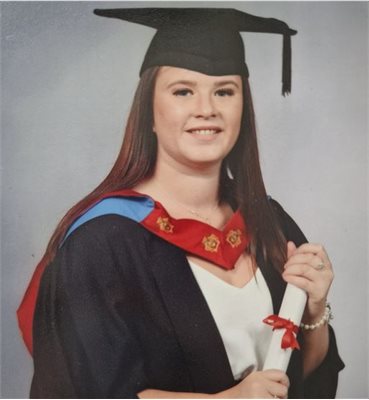Lydia's story

Lydia shares her story about growing up in foster care
Lydia is now an adult but has kindly shared her story about growing up in foster care.
Lydia says...
I was around six years old when I was taken into care. My dad had left when I was little, and my mum had been poorly for a long time. She was an alcoholic, so my early childhood was very chaotic, there was always something going wrong.
I remember that my aunty, my mum’s sister, was often the one who sorted things out. If I didn’t know who would be taking care of me for a night or if I needed picking up from school or from a police station, she would be there.
I remember having lots of conversations with adults; how would I feel about going to live with my aunty and uncle.
It’s hard when you’re a child and faced with that situation because you do really love your mum and dad. But I knew I didn’t want to live in that horrible chaos anymore.
I still remember the day when I was asked to get my things together and I moved. My grandad, who lived nearby, was very upset that my mum couldn’t take care of me anymore.
I know that if a young person goes to live with a family member, it can sometimes cause problems within the family, but my family were mostly ok with it. Because my aunty was my mum’s sister, she wanted to help her too, so she would go to lengths to make sure I saw my mum and her side of the family whenever I could.
I always appreciated that my aunty and uncle never saw me as ‘their child’. They were always mindful of the fact that I had loyalty to my mum, and they were respectful of my mum’s feelings too, they would consult her if they wanted to take me on holiday for example.
At first it was very traumatic to be living somewhere else. I cried a lot especially at nighttime.
My mum passed away when I was 13, which was really sad for all of us, as she’d been a really successful person at one time and still had so much to give in life. But after that I did start to feel more settled at my aunty’s; I started to see it as my home.
When I look back my aunty put in so much time and effort for me and for my mum too when she was alive. She had a daughter of her own who was four years older than me, and my cousin had different interests to me, but my aunty would always make sure I could do the activities I wanted to do. She took me to the theatre, which I loved, and always made sure I could go to clubs and activities, as well as running her own business.
I’ll never disregard what my aunty did for me, it still means everything to me. I went on to go to university and gained a degree in criminology and psychology and then a masters in forensic psychology. I now work in children’s services and I’m studying for a social work apprenticeship.
I know I wouldn’t be where I am today without my aunty’s commitment and enthusiasm.
There are so many times when I know I must have been a difficult young person to live with and when she could have said that she couldn’t do it anymore and I would have had to go and live with another foster family. But she stuck by me and helped to give me a stable home.
It can be hard to be a cared for child. I always felt different. I remember very clearly being in an assembly in my first year of high school and being given a certificate for having 100% attendance. I was so excited about the certificate and the achievement.
But at the end of the assembly the headteacher asked me in front of everybody to stay behind because I had to have my PEP meeting (a personal education plan meeting that cared for young people have) and I felt completely deflated.
I actually work with cared for children now as part of my role and I do think that my childhood experiences have given me an edge, even compared to my highly skilled colleagues. I’ve never forgotten how difficult it can be, so I completely empathise with them, and I think they appreciate being able to talk to someone who understands their situation from first-hand experience.
My main message to cared for children is to try and remember that now is only now, it won’t last, it’s not forever. Look to the future and take little steps to improve things for yourself. Tap into all the support that’s offered to you and you will flourish.
To foster carers or to anyone who’s thinking about being a foster carer, I would say, you can have such an important role in a young person’s life.
Foster care is not, ‘taking the young person away from their families’, it’s keeping them safe and helping them to manage the situation they are in, between their old life and their new one.
You’ll never be able to take all the bad things of the past away, but you can help them to find the right direction in life for the future.
If you are interested in finding out more about fostering in Wigan, complete our online enquiry form or call 01942 487200.
Posted on Monday 25th September 2023